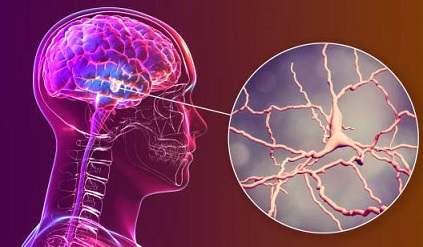HIV News: Unveiling The Intricate Relationship Between HIV-1 Infection And Neurodegeneration
Thailand Medical News Team Aug 24, 2023 2 years, 5 months, 1 week, 3 days, 3 hours, 42 minutes ago
HIV News: The global impact of the human immunodeficiency virus type 1 (HIV-1) has been immense, with over 39 million people living with HIV at the end of 2022. While antiretroviral medications have improved the lives of many infected individuals, HIV-1's ability to enter the central nervous system in around 80% of cases often results in neurodegeneration, giving rise to HIV-associated neurocognitive disorders (HAND). Scientists from Northwestern University Feinberg School of Medicine, Chicago-USA, in a new study have recently uncovered the intricate mechanisms through which HIV-1 interacts with the brain's cellular processes, shedding light on potential therapeutic interventions for HAND.
 The Enigma of HIV-1 and Neurodegeneration
The Enigma of HIV-1 and Neurodegeneration
Although HIV-1 does not directly infect neurons, it targets brain-resident immune cells like macrophages and microglia, leading to neuronal damage and contributing to the development of neurocognitive disorders. Despite extensive research, the exact mechanisms behind this phenomenon have remained a mystery. Dr Mojgan Naghavi, Ph.D., a professor of Microbiology-Immunology and senior author of the study, recognized the crucial knowledge gap and set out to explore the relationship between HIV-1 and neurodegeneration.
Dr Naghavi, who is also a member of the Robert H. Lurie Comprehensive Cancer Center of Northwestern University told
HIV News reporters from TMN, “Although HIV-1 does not infect neurons, it does infect brain-resident myeloid cells such as macrophages and microglia. However, how and why HIV-1 infection causes conditions such as HAND has remained enigmatic."
Previous Insights into Amyloid Precursor Protein (APP)
Dr Naghavi's earlier research uncovered a significant connection between amyloid precursor protein (APP) and HIV-1 infection. APP, which is expressed in brain-resident immune cells, plays a role in restricting HIV-1 replication. However, the virus counters this restriction by promoting the processing of APP, resulting in the production of beta-amyloid peptides, known contributors to neurodegeneration in conditions like Alzheimer's disease.
Mysteries Unveiled
Dr Naghavi and her team delved deeper into the cellular processes underlying the antiviral function of APP. Their study revealed that HIV-1's replication involves specialized compartments called multivesicular bodies (MVBs), which are also required for viral assembly. Normally, amyloidogenic processing sorts these MVBs to lysosomes, where cellular waste is disposed of, effectively suppressing viral replication. However, HIV-1 diverts this sorting process from lysosomes to exocytic pathways, supporting its replication but also increasing the secretion of beta-amyloids.
Dr Naghavi added, "We are currently trying to understand how HIV-1 and APP influence each other's vesicular localization and function, and thereby the fate of infectious virus and toxic amyloid production."
Crucial Therapeutic Insights
In a pivotal discovery, the researchers treated cultured cells with a clinically approved inhibitor of the APP processing pathway.
Remarkably, this inhibitor successfully blocked HIV-1's access to MVBs, suppressing viral replication in macrophages and microglia. These findings highlight the potential of targeting this pathway for the treatment of HIV-associated neurocognitive disorders, presenting a promising avenue for future therapeutic strategies.
APP's Dual Role
The study's findings also illuminated the dual role of APP in the context of HIV-1 infection. While APP acts as a suppressor of viral replication through its amyloidogenic processing pathway, it also produces toxic amyloids, contributing to neurodegeneration. This complex interplay between viral evasion and detrimental amyloid production offers a deeper understanding of the intricate relationship between HIV-1 and neurocognitive disorders.
Looking Ahead
Dr Naghavi emphasized that the study's findings could inform the development of therapies for HAND. Clinically approved inhibitors targeting APP processing could potentially be repurposed for this purpose, offering a dual benefit of inhibiting viral replication and mitigating amyloid-induced neurodegeneration. As researchers continue to explore the dynamic interactions between HIV-1 and APP, a clearer picture of their mutual influence on vesicular localization and function may emerge.
Conclusion
The study conducted by Northwestern Medicine scientists marks a significant milestone in unraveling the complex connections between HIV-1 infection and neurodegeneration. By deciphering how HIV-1 exploits cellular processes to replicate and contribute to neurocognitive disorders, the research offers hope for the development of innovative therapeutic approaches. As the global battle against HIV continues, these findings provide valuable insights that could potentially transform the landscape of HIV-associated neurocognitive disorders treatment.
The study findings were published in the peer reviewed journal: Nature Communications.
https://www.nature.com/articles/s41467-023-40000-x
For the latest
HIV News, keep on logging to Thailand Medical News.
